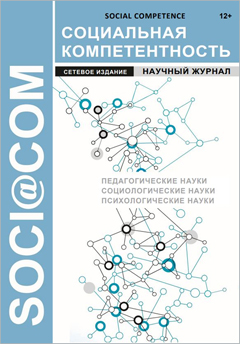Cognitive load when performing a learning task on visual-motor coordination in a virtual reality environment
DOI:
https://doi.org/10.24866/2658-5855/2023-2/55-61Keywords:
virtual reality, learning task, learning success, cognitive load, internal, extraneous and germane cognitive loadAbstract
The study of cognitive factors influencing the effectiveness of training in virtual reality is gradually becoming relevant due to the growing volume of implementation of virtual simulators in the field of vocational education. The purpose of this study is to empirically examine the role of cognitive load on students in the success of a learning task on hand-eye coordination in a virtual reality environment. The training task in a virtual reality environment was modeled after a game scenario in which the subject must shoot from a virtual bow at moving targets and gain points and advancement levels depending on the success of the actions performed. The success of completing the task was assessed by the accuracy of hits and the maximum level of complexity of task situations. Using a survey technique, 40 undergraduate pedagogical students were assessed for their subjectively perceived cognitive load (internal, extraneous and germane). The results obtained showed that when performing a learning task on visual-motor coordination, two types of cognitive load (extraneous and germane) play a significant role.
Downloads
References
Величковский Б.Б. Новые глазодвигательные методы оценки когнитивной нагрузки // Вопросы психологии. 2021. № 1. С. 119–129. Velichkovsky B.B. (2021) New oculomotor methods for assessing cognitive load. Questions of psychology. No. 1. P. 119–129. (In Russ.).
Поликанова И.С., Сергеев А.В. Влияние длительной когнитивной нагрузки на параметры ЭЭГ // Национальный психологический журнал. 2014. № 1(13). https://doi.org/10.11621/npj.2014.0109 Polikanova I.S., Sergeev, A.V. (2014) The influence of long-term cognitive load on EEG parameters. National Psychological Journal. No. 1(13). (In Russ.). https://doi.org/10.11621/npj.2014.0109
Селиванов, В.В., Селиванова, Л.Н. Виртуальная реальность как метод и средство обучения // Образовательные технологии и общество. 2014. T. 7(3). С. 378–391. Selivanov V.V., Selivanova L.N. (2014) Virtual reality as a method and means of teaching. Educational technologies and society. Vol. 7(3). P. 378–391. (In Russ.).
Смирнов А.С., Фадеев К.А., Аликовская Т.А., Тумялис А.В., Голохваст К.С. Технологии виртуальной реальности в образовательном процессе: перспективы и опасности. // Информатика и образование. 2020. № 6. С. 4–16. https://doi.org/10.32517/0234-0453-2020-35-6-4-16 Smirnov A.S., Fadeev K.A., Alikovskaya T.A., Tumyalis A.V., Golokhvast K.S. (2020) Virtual reality technologies in the educational process: prospects and dangers. Computer science and education. No. 6. P. 4–16. (In Russ.). https://doi.org/10.32517/0234-0453-2020-35-6-4-16
Birbara N.S., N. Pather. (2021) Instructional design of virtual learning resources for anatomy education. In: Instructional Design of Virtual Learning Resources for Anatomy Education. Springer Int. Publ. P. 75–110.
Frederiksen J.G. et al. (2020) Cognitive load and performance in immersive virtual reality versus conventional virtual reality simulation training of laparoscopic surgery: A randomized trial. Surg. Endosc. No. 34(3). P. 1244–1252.
Han J., Zheng Q., Ding Y. (2021) Lost in Virtual Reality? Cognitive Load in High Immersive VR Environments. Journal of Advances in Information Technology. No. 12(4). https://doi.org/10.12720/jait.12.4.302-310
Keshavarz B., Philipp-Muller A.E., Hemmerich W., Riecke B.E., Campos J.L. (2019) The effect of visual motion stimulus characteristics on vection and visually induced motion sick-ness. Displays. No. 58. P. 71–81. https://doi.org/10.1016/j.displa.2018.07.00
Leppink J., Paas F., Van der Vleuten C.M., Van Gog T., Van Merriënboer J.G. (2013) Development of an instrument for measuring different types of cognitive load. Behavior Research Methods. No. 45(4). P. 1058–1072.
Lukačević F., Škec S., Perišić M.M., Horvat N., Štorga M. (2020) Spatial perception of 3D CAD model dimensions and affordances in virtual environments. IEEE Access. Iss. 8. P. 174587–174604.
Moser I., Chiquet S., Strahm S.K., Mast F.W., Bergamin P. (2020) Group decision-making in multi-user immersive virtual reality. Cyberpsychology, Behav. Soc. Netw. No. 23(12). P. 846–853.
Mahmoudzadeh P., Afacan Y., Adi M.N. (2021) Analyzing occupants’ control over lighting systems in office settings using immersive virtual environments. Build. Environ. Vol. 196.
Parong J., Mayer R.E. (2021) Learning about history in immersive virtual reality: does immersion facilitate learning? Educational Technology Research and Development. No. 69(2). P. 1–19. https://doi.org/10.1007/s11423-021-09999-y
Ros M. et al. (2021)The effects of an Immersive Virtual Reality Application in First Person Point-of-View (IVRA-FPV) on the learning and generalized performance of a lumbar puncture medical procedure. Educ. Technol. Res. Dev. Vol. 69. No. 3. P. 1529–1556.
Sweller J., Ayres P., Kalyuga S. (2011) Categories of knowledge: an evolutionary approach. In: Cognitive Load Theory. Eds J. Sweller, P. Ayres, S. Kalyuga. New York, Springer. P. 3–14. https://doi.org/10.1007/978-1-4419-8126-4_1
Sweller J., van Merriënboer J.J., Paas F. (2019) Cognitive architecture and instructional design: 20 years later. Educational Psychology Review. No. 31. P. 261–292. https://doi.org/10.1007/s10648-019-09465-5
Downloads
Published
Issue
Section
License
Copyright (c) 2023 Scientific journal Social Competence

This work is licensed under a Creative Commons Attribution-NonCommercial-NoDerivatives 4.0 International License.


